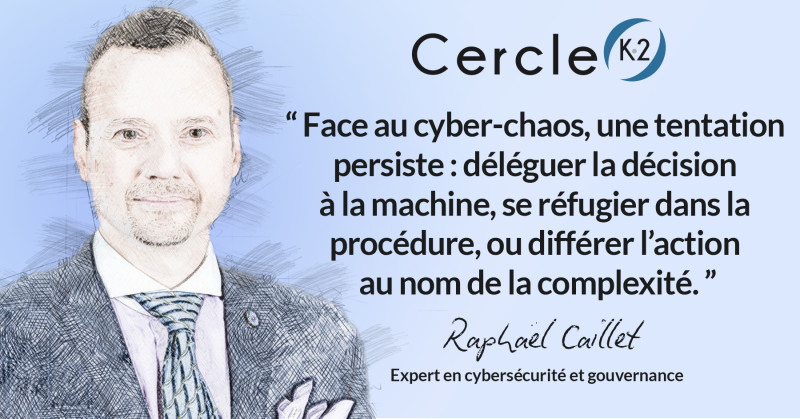[ENGLISH VERSION] Growth and Innovation for traditional SMEs
30/09/2023 - 3 min. de lecture
![[ENGLISH VERSION] Growth and Innovation for traditional SMEs - Cercle K2](https://cercle-k2.fr/storage/4904/conversions/kevin-dumoux-k2-q4-23-en-large.jpg)
Cercle K2 neither approves or disapproves of the opinions expressed in the articles. Their authors are exclusively responsible for their content.
Kevin Dumoux is co-creator of Cercle K2. He runs a consulting firm which helps SMEs in their strategic and digital transformations.
---
Read the French version / Lire la version française
---
In the highly competitive business environment, where markets frequently become saturated, traditional SMEs (small and medium-sized enterprises) encounter significant challenges. They find themselves caught between agile startups, which often secure substantial financing (from venture capital, private equity, etc.), and multinational corporations that naturally possess greater access to financial and human resources.
SMEs are usually heterogeneous in their structure and approach. Numerous SMEs have been established for many years and come from traditional business models. They often have strong local/ regional roots and enjoy close relationships with their suppliers, partners and customers. This stability can be beneficial in some respects, nonetheless, can also become barriers to development and innovation. When it comes with rapid changes led by external factors, such as technological advances, crises, or simply consumer behaviors, traditional SMEs are less prepared to respond and adjust their approach efficiently.
Facing with these challenges, how can traditional SMEs navigate this fierce competitive landscape to innovate, adapt and ultimately thrive?
Financial management: the nerve of the war
Financial management is often treated as an administrative function rather than a strategic one. It is often noted that SMEs face challenges regarding not only capital, but also insufficient management skills to apply effective practice in strategic financial management. Effective financial management goes far beyond mere accounting. It involves in-depth analysis on income, expenses, and investment opportunities. SMEs need to adopt advanced financial tools, such as real-time financial dashboards, predictive analytics, and even artificial intelligence for decision making. These tools not only help SMEs track performance in real time, but also provide useful insights on future trends which contribute a key success factor in making strategic decisions. In short, strategic financial management is not a luxury, but a necessity for SMEs looking into scale up opportunities.
Adopt the Practices of Fast-Growing Businesses
The business world is constantly changing, and companies that fail to adapt have been left out. This is particularly true in recent years, with the world experiencing unprecedented crises. A rising voice has been shed on the importance of SMEs adopting agile management practices and advanced technology to cope with fast-paced changes and challenges [1]. Agile management methods, such as Scrum or Lean, allow greater flexibility and responsiveness to market changes. Indeed, these methodologies are not applicable for SMEs in all phases, however, a clear and thorough analysis is often the first step to assess the fit and feasibility. In some cases, the adoption of advanced technologies, such as AI, IoT(Internet of things), can offer significant improvement and innovation to achieve competitive advantages. Moreover, a culture of innovation shall be implemented through all levels in the company. This can be achieved by thorough human resources training, KPIs for innovative projects, or partnerships with startups or research centers.
Developing an entrepreneurial mindset
Entrepreneurship is not just for startups; It is a state of mind that can and should be cultivated in all business, regardless of their size or history. According to OECD [2], this entrepreneurial mindset should be encouraged among SMEs. This is even more true for the so-called 'traditional' SMEs. This implies investment in training and skills development, not only for managers but also for employees. Mentoring programs, creativity workshops, and incentives of taking risks can all help foster this mindset. SMEs also need to create an environment where making mistakes is seen as an opportunity to learn rather than a failure. By promoting a culture of innovative and entrepreneurial mindset, SMEs can not only improve their product or service, but also attract highly motivated talent, which is often a challenge for small business.
Closing the technology gap
In a world where technology is evolving at a rapid pace, SMEs that do not adapt are at risk of failing. According to a study by OECD [2], SMEs have a technological gap to bridge. This gap is not only in terms of the adopting new technologies, but also in terms of integrating and efficiently using these technologies in the day-to-day operations. Adopting proven technologies can accelerate this process and minimize the risks associated with experimenting with new solutions. For example, applying proper CRM systems can help SMEs better understand their customers and personalize their offerings. Similarly, adopting AI for effective data analysis can provide valuable insights into company performance, market trends and growth opportunities.
However, it is not just about adopting the latest trendy technology. SMEs must be strategic in their technology adoption and extremely pragmatic in their operational deployment. This means carefully assessing the business's needs rather than just responding to operational requests, understanding the associated tangible and intangible costs, and evaluating the potential ROI in medium and long term.
Successful technology adoption also requires proper employee training and smooth integration within the existing systems.
Export: A Frontier to Cross
Export represents a significant opportunity for SMEs looking to scale up. However, it can easily be a daunting task, especially for small businesses that are lack of integrated resources to navigate the complexities of international markets. In France, several governmental initiatives aim to support SMEs in their export efforts. French government is working to improve both public and private sectors to facilitate the international development of SMEs.
One of the major assets for French SMEs is CCE- Conseillers du Commerce Extérieur de la France[3]. They offer expertise to SMEs who are seeking to export their products or services, assist in identifying target markets and understanding local regulations, and even help to establish business contacts.
Business France [4] is another government initiative that provides valuable support to SMEs. This agency helps companies understand foreign markets, find business partners, and navigate regulatory complexities. Business France also organizes networking events and trade missions to assist SMEs in building international business relationships.
To conclude
In a fast changing world, stability often is an enemy to business growth. SMEs with a traditional business model need to reconsider their positioning and adopt a holistic approach to combine rigorous financial management, technological tools, agile methods, and last not least, an innovative and entrepreneurial mindset. By integrating these ingredients and creating a fitting recipe to strategy, SMEs do not just survive, they thrive
---
[1] ACCA
[2] OCDE
[4] https://www.businessfrance.fr/
30/09/2023















